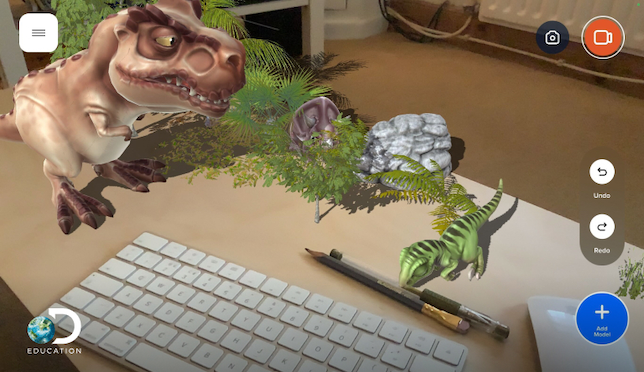Discovery Education Introduces Free Augmented Reality App for Students and Educators
Sandbox AR Lets Users Create Virtual Worlds or Augment Their Own — All Linked to Real World Knowledge
- By Kristal Kuykendall
- 01/25/22
Discovery Education today introduced its new Sandbox AR iPad app, giving students and educators no-cost access to an immersive learning tool using augmented and virtual reality to create interactive learning experiences that unlock students’ natural curiosity.
By superimposing virtual images and data on a user's view of the real world, AR allows learners to visualize and interact with complex topics and heightens student engagement with digital content. The Sandbox AR app empowers students and teachers to create, share, and even inhabit virtual environments; users can create virtual “scenes” and populate those scenes with any of the hundreds of built-in unique objects from history, science, nature, and more, Discovery Education said.

The app also has a mode allowing users to scale up and inhabit their own environments in a virtual setting, using their iPad to take photos of what’s around them; that virtual world or scene can then be filled with the app’s built-in objects to create a scene mixing virtual and augmented reality, Discovery Education told THE Journal recently. The objects within the app each connect to information about its history (such as the Great Pyramid at Giza), its origins in the natural world (such as an African elephant), and so forth.
Once a user has their Sandbox AR scene built to their satisfaction, they can take photos or record a video walkthrough with their own voiceover, to introduce their classmates or their teacher to what they created or what they learned, for example.
To help educators leverage the power of AR wherever learning takes place, Discovery Education has made the Sandbox AR iPad app available for free in the Apple App Store.
“We know educators and students love augmented reality,” explained one of the app’s developers, Phil Birchinall, Discovery Education’s senior director of immersive content. “Sandbox gives students the ability to control and have some agency over that augmented reality.”
Sandbox adds multiple laters of data over the scene users create, using built-in links attached to each object within the app to teach users “real world” information about each object they’re seeing in their “virtual world,” he explained.
“Sandbox AR gives students the ability to immerse themselves in whatever scene or topic they’re learning and really show their knowledge,” said Jason Ediger of Discovery Education. “This app will have a real impact in the classroom and on learning outcomes. Highly engaging content is important, but giving kids a sense of ownership — underpinned by proper learning concepts — is the key.”
Sandbox AR has pre-made scenes such as ancient Egypt, Mayan ruins, road construction worksites, space exploration, and more, as well as hundreds of individual objects that students or educators can use to build their own scenes. Each scene and object links to learning materials, or for teachers using the app, each links to instructional materials.
Visit the Discovery Education website to view a demo video of the Sandbox AR app's capabilities.
“It’s critical for teachers to understand the power of this tool for them and their students, so we’ve included lessons for educators on how to use this in their teaching,” Ediger said. “The uses of this are endless — students can inhabit an AR world they build and truly experience it; it could be part of a mindfulness meditation, or a game” or a lesson on endangered species like the African elephant.
Birchinall, a former teacher himself, said his team created the Sandbox AR with purpose, not just to bring cool tools to the classroom. “We know AR has a huge impact on learning,” he said. “Tools like these amplify the power, depth, and speed of student learning.”
Discovery Education first entered the education technology world over two decades ago, digitizing educational video content previously brought into classrooms on VHS tapes and media carts, and then introducing digital textbooks.
“While 2021 marked Discovery Education’s 20th year of providing innovative digital learning solutions to educators worldwide, it also began a new chapter in the company’s history,” said Discovery Education Chief Executive Officer Scott Kinney. “Sandbox AR and resources we make available to educators today are just the beginning of what will be a number of powerful new resources Discovery Education plans to provide students and educators in 2022 and beyond.”
Discovery Education also introduced DE Originals today. Produced by Discovery Education’s curriculum team, DE Originals are streaming videos featuring former teachers presenting assorted topics to students in a “fun and engaging fashion,” the companys aid. DE Originals are exclusively available to subscribers of Discovery Education’s K-12 learning platform.
The more than 100 new DE Originals kick off with the DEmystfied series, which explains complex science concepts through fun, funny, short, digestible, and standards-aligned videos. Combining Discovery Education’s signature storytelling style with creative graphics, DEmystfied helps students ask and answer questions about the world around them. Discovery Education users can access DEmystfied through the DE website.
For more information about Sandbox AR, educators can view the Sandbox AR quick start guide or check out a free Sandbox AR lesson. To learn about Discovery Education’s digital learning resources, visit www.discoveryeducation.com.